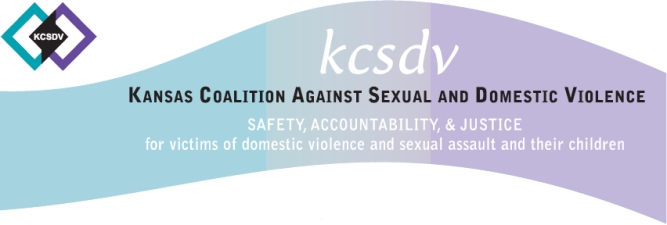Summer 2007 Newsletter

Dropping out of the sky is one of Jason Struemph’s passions in life, so he thought he would raise money for charity while doing it.
Skydive Kansas, along with skydiving enthusiast Struemph, organized the first “Drop Abuse” fundraiser to benefit KCSDV on June 14 at the Skydive Kansas hanger at Osage City’s airport.
Struemph successfully completed 53 jumps, which set the state record for the most skydives in one day.
It took just over eight hours for Struemph to make 53 skydives, one for each incident of domestic violence reported to law enforcement daily across the state.
“I’m the one lucky enough to get to do it,” Struemph said, thanking the many people from the skydiving community for making the event possible.
About 12 fellow skydivers and friends volunteered to pack nine different parachutes, fly the plane, track donations, and drive Jeremy in a donated golf cart from where he landed to across the field where the plane sat ready to take him up again.
About $3,000 was raised for KCSDV.
Struemph came up with the idea while talking with his skydiving instructor and owner of Skydive Kansas, Jen Sharp.
“We felt that there are a lot of great charities out there and we felt that this was a good one that needed more attention,” Struemph said.
“Jumping out of an airplane 53 times should get people’s attention.” Sharp agreed. “With a little more attention to the issue, we thought we could make a huge difference.”
You can still donate a dollar amount!
Visit www.skydivekansas.com/dropabuse/ or call Skydive Kansas at 785-840-JUMP (785-840-5867).

Skydiver Jeremy Struemph (left) celebrates with Chris Hubbell, who was the pilot on all 53 skydives during the “Drop Abuse” fundraiser

It took 18 staff and volunteers of Skydive Kansas to make the fundraiser possible.
Updates on domestic and sexual violence
The information below contains summaries of enrolled bills passed during the 2007 Kansas Legislative session. These summaries do not reflect the entirety of the statutory changes included in any one bill. Readers should consult an attorney and/or read the entire bill before relying on it for any legal actions.
SB18: Uniform Child Abduction Prevention Act (UCAPA).
PASSED AND SIGNED.
This would allow for the filing of a motion to prevent possible child abduction. This has some good pieces to it IF the abuser does not use these provisions mischievously. We have asked for two things to accompany UCAPA: (1) publishing the official comments to the Act in the statute books so practitioners can see the intent of the legislation, and (2) amending the Kansas parental kidnapping crimes. See SB182 below. Effective 07.01.07: it should include comments from the National Conference of Commissioners on Uniform State Laws (NCCUSL) in the Kansas statute book. NCCUSL is an organization that drafts and advocates for enactment of uniform state laws. Comments to uniform laws drafted by NCCUSL often contain clarifying information about the intent of the drafters.
SB182: Crimes concerning Interference with Parental Custody.
DID NOT PASS.
This bill would have amended the crimes of Interference with Parental Custody (K.S.A. 21-3422) and Aggravated Interference with Parental Custody (K.S.A. 21-3422a) to provide an exception and a defense for those parents who flee with their children in order to protect the child or themselves from mistreatment or abuse. The exception keeps the protective parent from being charged if she does certain things after fleeing; the defense allows her to raise the abuse as a defense if she is charged. SB182 did not pass but an interim committee met August 16 for further review.
SB31: “Elliott” fix.
PASSED AND SIGNED.
This law will allow municipal courts to charge enhanced penalty crimes that could be charged as a felony due to prior convictions. Domestic Battery is one such crime. The Elliott case, decided by the Kansas Supreme Court last year, prohibited municipal courts from charging these enhanced penalty crimes if they could be charged as a felony. As a general rule, municipal courts cannot charge felonies. We will need to watch for the impact of this new law on third-time convictions for Domestic Battery.
SB68: Anti-bullying.
PASSED AND SIGNED.
This law will require school boards to adopt policies prohibiting bullying on school property, in a school vehicle, or at a school-sponsored activity. It also requires school boards to develop and implement a plan to address bullying on or before January 1, 2008. Bullying is defined in the new law.
HB2006/HB2372/SB2: Unborn Victims of Violence Act/Alexa’s Law.
PASSED AND SIGNED.
For purposes of criminal laws, “person” would include a fetus.
SB204: Kansas Offender Registration Act Amendments.
PASSED AND SIGNED.
This will amend the Kansas Offender Registration Act by adding a person convicted of Aggravated Trafficking to the definition of offender; eliminates the requirement of the KBI to send letters every 90 days to verify address, etc.; requires offenders to report to sheriff four times per year and pay a $20.00 fee per reporting.
Governor Kathleen Sebelius was recently awarded a federal grant that will involve a multi-disciplinary, multi-agency, statewide training initiative. KCSDV is one of the grant partners and will house the Project Coordinator and three other staff funded under the project.
The Grants to Encourage Arrest Program (GTEAP), a grant program out of the Department of Justice, is designed to improve the criminal justice system’s response to domestic violence. The grant will focus on training and model protocol development.
Grant partners include Governor Sebelius, KCSDV, the Kansas Law Enforcement Training Center, the Office of Judicial Administration, the Kansas County and District Attorneys Association, and the Kansas Department of Corrections. Training initiatives will include judges, prosecutors, law enforcement officers, corrections officials, and victims’ advocates.
For more information, contact Sara Rust-Martin, GTEAP project coordinator at KCSDV, at srust-martin@kcsdv.org or 785-232-9784.
Including and engaging men and boys in domestic violence prevention efforts was the focus of a KCSDV training in May in Topeka.
Josh Edward, DELTA Project State Coordinator with the Alaska Network on Domestic Violence and Sexual Assault, trained participants on the basics of prevention, its place in regards to intervention efforts, and how to include and sustain men and boys in the movement to prevent first-time domestic and dating violence.
“Men are already allies, albeit silent ones many times,” Edward said. “We just need to give men more opportunities to be allies.”
“I hope the attendees will recognize the need for prevention and that both intervention and prevention are needed if social change is to occur,” Edward said.
He explained that prevention is more than just a one-time presentation about the warning signs of dating violence.
“We need to recognize that raising awareness about the warning signs is important, but that is not the same thing as students having tools and skills they need to have healthy relationships, which is prevention,” Edward said.
Prevention would include actually learning how to communicate in a relationship, what acceptable expressions of anger look like, and for boys and men to learn how to recognize and address their own issues around sexism.
“Young men should be questioning social norms and what they think of as their masculinity and ask what does a man act like,” Edward said. “I hope we build a kind of collaborative dialogue across communities, states and nations about how men are socialized and what mens and cultures expectations are around masculinity.”
Prevention, Edward said, is wide-ranging and activities should be happening on many levels of our society, referring to the Social Ecology Model that guides domestic violence prevention efforts. For more information about this model, read KCSDVs Summer 2006 newsletter at https://www.kcsdv.org/learn-more/resources/newsletters/summer-2006/.
For more information about domestic violence prevention, contact Debby Zelli, domestic violence prevention coordinator at KCSDV, at dzelli@kcsdv.org or 785-232-9784.
The concept of prevention is an ongoing and long-term process and is about social change. It is not just giving a one-time presentation to a group of people. It is about changing conditions that support intimate partner violence, promoting conditions that inhibit intimate partner violence, and promoting the behaviors you want people to adopt.
Healthy Relationships Tools for Men and Boys
~ Josh Edward
- Men and boys learning how to communicate within a relationship
- Men and boys learning what acceptable expressions of anger look like
- Men and boys learning how to recognize and address their own issues around sexism
- Men and boys learning to question social norms regarding masculinity and what “real” men and “real” women act like
Resources
- KCSDV’s Summer 2006 Newsletter
www.kcsdv.org/summer06.html - Michael Kaufman’s 7 P’s of Men’s Violence
http://michaelkaufman.com/1999/10/the-7-ps-of-mens-violence/ - Toolkit for Working with Men and Boys
http://toolkit.endabuse.org/Home - Men Can Stop Rape
http://mencanstoprape.org - The White Ribbon Campaign
www.whiteribbon.ca

Josh Edward, DELTA project state coordinator with the Alaska Network on Domestic Violence and Sexual Assault
In September 2003, after an unanimous vote by both houses of Congress, President Bush signed the Prison Rape Elimination Act (PREA) into law. This groundbreaking law addresses the longstanding but largely ignored problem of prison rape in the U.S. Although the focus of PREA is to prevent rape and sexual assault, it also emphasizes meeting both the medical and psychological needs of victims.
PREA requires that all prisons (state and federal, public and privately operated), jails, juvenile detention centers, immigration detention facilities, and boot camps track and report the incidences of rape and sexual assault in their facilities.
In early 2005 the Kansas Department of Corrections (KDOC) asked KCSDV to partner with it in order to continue its efforts to address the possibility of sexual violence occurring in Kansas prison facilities. Building upon an existing collaborative relationship, KCSDV is assisting KDOC to facilitate review of existing policies and procedures regarding sexual violence in prison facilities. KCSDV has hired a Prison Rape Policy Coordinator to coordinate this policy review committee. The committee is comprised of KDOC personnel and community-based sexual assault advocates, and will review policies and make recommendations for possible improvements.
It is foreseeable that inmates, both currently incarcerated and recently released, may seek services from local programs for a sexual assault that occurred during their incarceration. Therefore, the Coordinator is also working with community-based sexual assault programs to address the needs of these victims.
For more information, contact Mickayla Fink, prison rape policy coordinator at KCSDV, at mfink@kcsdc.org or 785-232-9784.

www.victimlaw.info
In April the National Center for Victims of Crime launched VictimLaw, a free, on-line database of victims’ rights laws and protections. The searchable database includes more than 15,000 victims’ rights statutes (state and federal), tribal laws, constitutional amendments, court rules, and administrative code provisions. It will be regularly updated and will soon include state attorney general opinions and summaries of court decisions related to victims’ rights. Funding for the database was provided by the Office for Victims of Crime, Office of Justice Programs, U.S. Department of Justice.
Sexual Violence Against Native Women Report
In April, Amnesty International, a human rights organization, released a report on the criminal justice system’s failure to protect Native American women from sexual violence. Titled “Maze of Injustice,” the report features primary research of criminal justice personnel, Native victims and victims’ advocates. It also includes a review of existing government and non-government reports, including studies by the U.S. Department of Justice, law review articles and media reports of sexual violence against Native American and Alaska Native women.
Read or listen to more on this story:
- Report: Maze of Injustice: The failure to protect Indigenous women from sexual violence in the USA, 4.24.07
http://web.amnesty.org/library/index/engamr510352007 - News Story: Rapes, Abuse High for Indigenous U.S. Women, 4.24.07
http://www.npr.org/templates/story/story.php?storyId=9803207 - Amnesty International’s Stop Violence Against Indigenous Women Campaign
http://web.amnesty.org/actforwomen/usaindigenous-240407-editorial-eng - National Public Radio’s Two-part Series:
- 7.25.07 Rape Cases on Indian Lands Go Uninvestigated
http://www.npr.org/templates/story/story.php?storyId=12203114 - 7.26.07 Legal Hurdles Stall Rape Cases on Native Lands
http://www.npr.org/templates/story/story.php?storyId=12260610
- 7.25.07 Rape Cases on Indian Lands Go Uninvestigated

KCSDV has begun to distribute “Information for Judges about Domestic Violence,” a collection of articles gathered by KCSDV for judges.
This three-ring binder contains articles from journals and resources from judicial publications targeted specifically at judges and their judicial duties. Some information includes best practices or checklists for judges in handling cases in which domestic violence is present.
Although only 70 copies were initially made, many member programs have requested more for district, magistrate and municipal judges in their service areas, and these additional copies will be distributed by programs or sent directly to the judges.
For more information, contact Jean Rosenthal, legal services committee coordinator at KCSDV, at jrosenthal@kcsdv.org or 785-232-9784.

KCSDV has published the Kansas Protection Order Manual in an effort to assist those involved in the protection order system in Kansas.
Funded by the Federal S.T.O.P. Violence Against Women Act Grant Program as administered by Kansas Governor Kathleen Sebelius’ Federal and Other Grants Program, the manual is the result of a collaborative project between KCSDV, Kansas Legal Services (KLS) and the Office of Judicial Administration.
Because it will be distributed to advocates, courts and KLS attorneys statewide, its main focus is on statutory law and best practices gained by those involved in the field. It includes screening and safety information, specific laws and procedures and immigration information. It also contains all relevant Kansas statutes and summaries of Kansas cases.
For more information, contact Joyce Grover, general counsel at KCSDV, at joyceg@kcsdv.org or 785-232-9784.
Danae Roberts joined KCSDV in January. She received her Ph.D. in Educational Psychology from the University of Kansas in 2006. Danae has worked as a research specialist at the Kansas City Free Health Clinic, a research assistant for the Center for Research on Learning at the University of Kansas, the Heartland Forgiveness Project, and the Wisdom Study Project. Danae’s areas of expertise are learning theories and practice, human development, research and data collection methodologies (including quantitative, qualitative and statistical analyses), training program implementation and evaluation, and proposal and research results writing.
Kathy Ray joined KCSDV in December as the Curricula and Protocol Coordinator for the GTEAP project. She has worked with victims of domestic violence and sexual assault for the past three years, and most recently served as the Parent/Child Advocate for The Crisis Center in Manhattan, Kan. Kathy received her bachelor’s degree from Kansas State University in sociology with minors in women’s studies and business. She is currently working towards her master’s degree in social work from Washburn University.
Mickayla Fink joined KCSDV in January as the Prison Rape Policy Coordinator, working in conjunction with the Kansas Department of Corrections. For the two years prior to working at the KCSDV, she was a graduate instructor of English and Women’s Studies at K-State. Mickayla also worked for more than four years at K-State’s Women’s Center, and volunteered for two years at the Crisis Center, Inc, a KCSDV member program in Manhattan. She has a master’s in English and cultural studies, and a graduate certificate in women’s studies, and a bachelor’s in political science and women’s studies, all from K-State.
Sara Rust-Martin is a recent graduate of Washburn University School of Law. Prior to joining KCSDV, she was a Governor’s Fellow. Prior to attending law school Sara served as a United States Peace Corps Volunteer. She also has experience as a supervisor of childrens’ programs at a community mental health center, and as the program director of a drug and alcohol treatment center. Sara earned a bachelor’s degree in social work from Pittsburg State University and a master’s degree in social work from the University of Kansas. She has served as the GTEAP Project Coordinator since December.
Tami Shenk became Accounting Assistant in February. She has 14 years experience in accounting. Tami has an associate’s degree in art from Highland Community College.
KANSAS CRISIS HOTLINE: 888-END-ABUSE | 888-363-2287